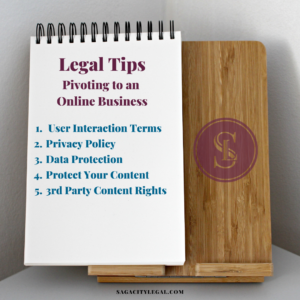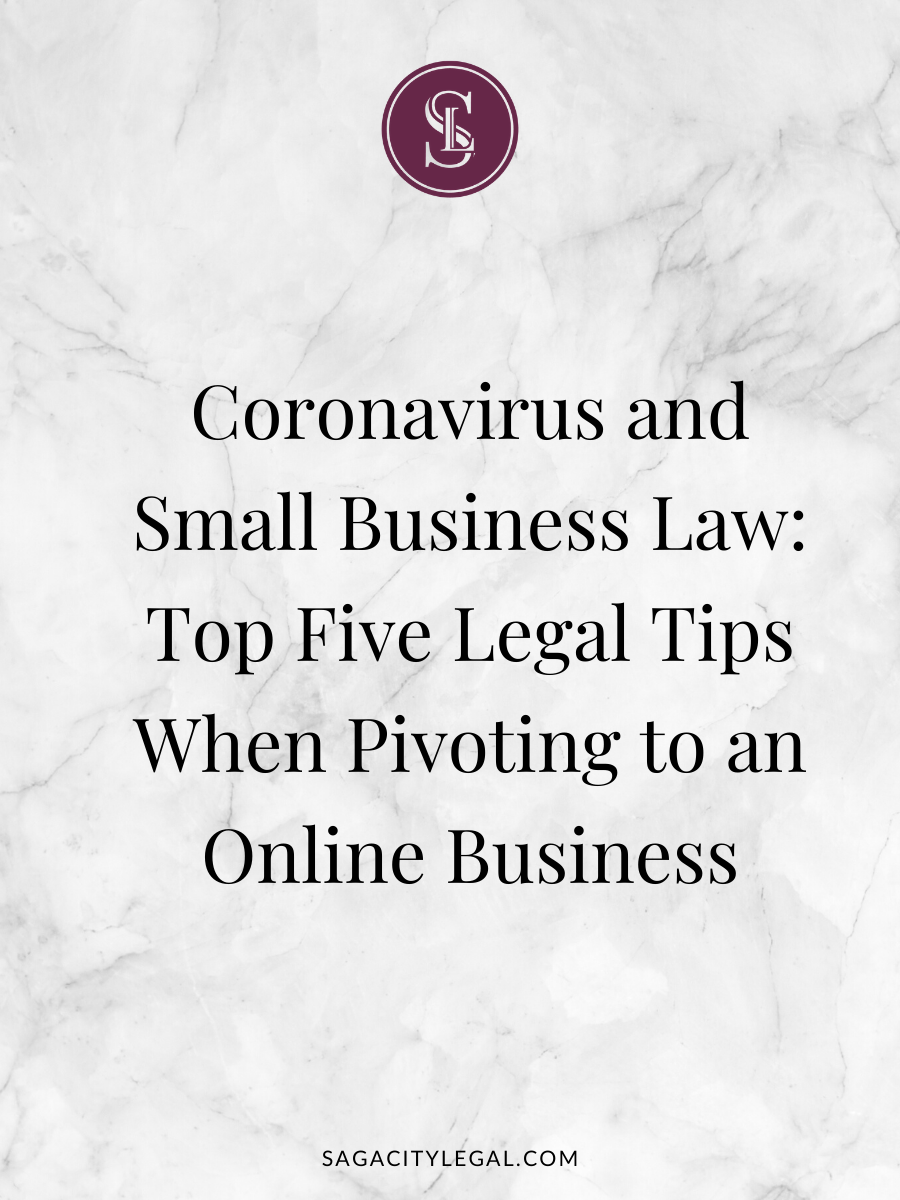
THE CORONAVIRUS AND SMALL BUSINESS LAW SERIES
This blog post series provides key legal tips to help you secure your business success during the Coronavirus pandemic. With this knowledge, you can return to what you do best – your service or product.
Today’s topic: Pivoting from Brick & Mortar to an Online Business during the Coronavirus Pandemic
I’ve been privileged to work with some fantastic businesses! With their brick and mortar businesses shuttered, these entrepreneurs quickly pivoted online.
Even in a race to re-open online, securing your success legally remains critical. In this blog post, I share my top five legal tips.
“Opportunities don’t happen. You create them.”
— Chris Grosser
Topic #5: Top Five Legal Tips When Pivoting to an Online Business

 Tip #1 Online User Interactions Terms
Tip #1 Online User Interactions Terms
Like many businesses, you may have moved online with your clients. You breathe a sigh of relief that the technology works. Kudos to you.
In this new online-based economy, protect yourself and your business with terms and conditions and agreements.
Terms and Conditions should clearly define your company’s rules for others posting content. The terms should also include a disclaimer stating how users can use the information on your website. You should also clearly state what liability (if any) your business accepts.
Don’t forget about accessibility regulations as well. Your website must provide equal access to all web users, including those with a disability.
 Tip #2 Online Privacy Policy
Tip #2 Online Privacy Policy
Be extremely cautious of protecting user information that your website, video service, or other online technology collects. Clearly provide a written privacy policy that details what personal information your business collects, and how you use that information.
Be sure any personal information you collect and use complies with privacy laws around the world.
Include a cookie disclosure stating how your business uses cookies on your website.
Also, any communications generated from your website (such as email subscriptions) should include an “opt-in” to comply with anti-spam laws.
 Tip #3 Online Data Protection
Tip #3 Online Data Protection
With data breaches being so prevalent these days, take precautions to prevent being hacked and include information for those accessing your website of what your security policy includes.
If you are selling online, you need to pay special attention to e-commerce security and regulations and consumer protection laws.
Routine backups of your documents and content are essential for your practice and clients’ privacy.
In general, be aware of both your government compliance legal obligations and your contractual legal obligations; and ensure that you adhere to all.

Tip #4 Protect your Online Content
As an online business, your content is key to your livelihood. Your content is the expression of your talent, expertise, and value.
The widespread availability of your content may provide a vast marketplace for attracting business, but it also provides a vast number of opportunities for others to steal your content, use your content without your permission, and even take credit for it.
Now more than ever, it is critical to claim and secure your content ownership.
First and foremost is the inclusion of notices on all content you create. You can include a copyright notice on your website, publications, and videos. You can include a trademark notice with your name, logo, and tagline.
A copyright or trademark notice is like a “no trespassing sign” at the entrance to property. It doesn’t actually prevent violations of the law, but it puts everyone on notice that your property is private, protected, and patrolled.
For your key content, consider registering the copyrights and trademarks as well. Registration provides additional protection to the owner, such as the right to sue for infringement.

Tip #5 Careful of Online 3rd Party Content
Let’s now turn to protecting your use of other’s content within your online business. Inadvertent use without permission of someone else’s protected content can put your business at risk.
Lack of knowledge or lack of intent do not shield you from liability. The ease of merely copying content from one site to another may leave you exposed to liability under copyright law, trademark law, or even violation of online terms.
Be cautious of using content you did not 100% create. Try to use your own creations or licensed material.
When not readily clear, try to obtain permission to publish from the content owner.
Awareness and best practices in using other people’s content can be a valuable mechanism to minimize your legal risk. Start today: evaluate your current practices and take that first step to securing your success.
As you focus on creating and growing your online business, it’s easy to lose sight of the everyday legal considerations.
Avoiding unnecessary risk will directly impact your future success.

Check out the entire Coronavirus and Small Business Law Series here.
Do you need help with securing the success of your online business? If you’re a Florida business or resident, I can help. Contact me here.


leave a comment on this post.